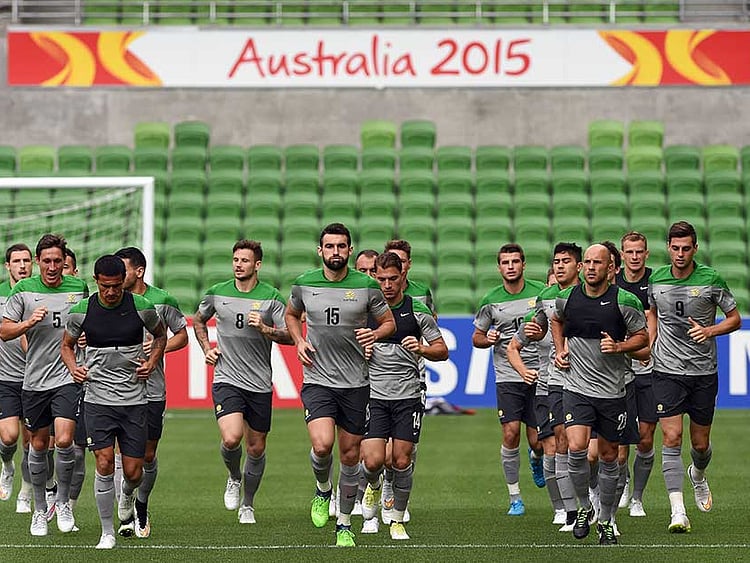Sydney: Unite for passion. Unite for the Asian Cup. That is the slogan being played out on Australian TV screens in preparation for the kick-off of the Asian Cup in Melbourne on Friday evening.
It is certainly an arresting call to arms for a nation not immediately known for its interest in football, but there is a niggling worry in the five cities that will play host to the tournament, which culminates on January 31, that it is being relayed more in hope than expectation.
Where you may normally expect to find excitable billboards in airports and train stations on the eve of a major tournament, the lack of a visible build-up campaign for the Asian Cup around Sydney and Melbourne has been noticeable by its absence.
But that is not to say that, with Australia’s opener against Kuwait at the Melbourne Rectangular Stadium just hours away, there has not been a slowly emerging tide of interest.
Socceroos shirts, and those of potentially their fiercest rivals for the Asian crown, Japan, have been increasingly visible around Sydney as the tournament has drawn closer. The hope is that, in such a multicultural and heavily touristed city, there will be plenty of other colours — South Korean, Chinese, Iranian, Emirati — seen about the place as well in the weeks to come.
The media has also begun to take an active interest as Australia prepares for its biggest tournament since hosting the Rugby World Cup more than a decade ago, with the Sydney Morning Herald in particular offering daily features leading up to the event, not to mention the ‘Unite’ adverts on television.
And, gradual though it may have been, it seems as though the public are now responding. Ticket sales are reported to be promising and there has been a real drive in the last few weeks to gain the interest of multi-ethnic football fans in a country where 12 per cent of the population identify as Asian.
The true excitement has of course come from the fans who already follow football in Australia, and a cause for that excitement is the seemingly sheer openness of the tournament. Really, so the consensus has it, just about anybody could end up lifting the trophy in Sydney on January 31.
In the home media there is a growing conviction that this could be the Australians’ best ever chance to take the crown, and anything less than a semi-final place will be viewed as a failure. Few would bet against them — in Nathan Burns they have a striker in fluid domestic goalscoring form and old heads like Tim Cahill and Mark Bresciano will provide the kind of experience that could take them all the way.
The main worry is that a weight of expectation will kill the dream, owing to their dual roles of both going out to win games of football, and going out to win the public’s interest in the tournament as a whole.
In that vein, plenty of pressure is being put on the Socceroos to not just beat Kuwait on Friday, but to defeat them convincingly — and in an entertaining fashion — in order to both show their intent and draw the attention of a nation of football sceptics.
Even so, the smart money still seems to be on Japan upsetting the Australian party. With undoubted talent in their ranks in the shape of players like Shinji Kagawa and Keisuke Honda, they will be looking to make up for a disappointing, winless World Cup 2014. Added to that is the Blue Samurai’s sheer history of success in the tournament, with four triumphs in the previous six championships.
However, match-fixing allegations involving their Mexican coach Javier Aguirre, which came out as recently as two weeks ago, could prove unsettling.
Other traditionally strong teams will also be there or thereabouts come the latter stages, but all have potential problems. South Korea have a young and inexperienced side, for them this tournament may come too soon. Iran, meanwhile, are simply unprepared — and that’s according to their own coach, Carlos Queiroz, the former Real Madrid boss.
And so the field is thrown open ever wider, with the world waking up to the talent that has been produced off the back of strong investment in the burgeoning football markets in the Gulf.
Indeed, many in the Australian national media are predicting the UAE team will field the player — Omar Abdul Rahman — most likely to single-handedly bring the tournament to light and capture the imagination of the viewing public.
Inevitably though, like most international competitions, the press have been keen to mix political and human interest stories with the football in their last-minute leaders.
To that end, Palestine are already every Australian’s second favourite team before a ball has been kicked thanks to their remarkable performance in even reaching the tournament, while Iraq continue to amaze everybody with their fortitude and togetherness. North Korea, meanwhile, have got the headlines for remaining as mysterious and intriguing as expected.
But ultimately, when the tournament kicks off, all of these political asides will be forgotten. It will be the quality of the matches that will determine whether that small tide of expectation, which has taken its time to arrive in Australia, will continue to grow or will ebb away.
All eyes will be on Melbourne on Friday in the anxious hope that the beginning of the 16th Asian Cup brings with it passion and excitement, and that atmosphere builds even more over the 32 games to the final.
— The writer is a freelance journalist
Sign up for the Daily Briefing
Get the latest news and updates straight to your inbox
Network Links
GN StoreDownload our app
© Al Nisr Publishing LLC 2025. All rights reserved.
